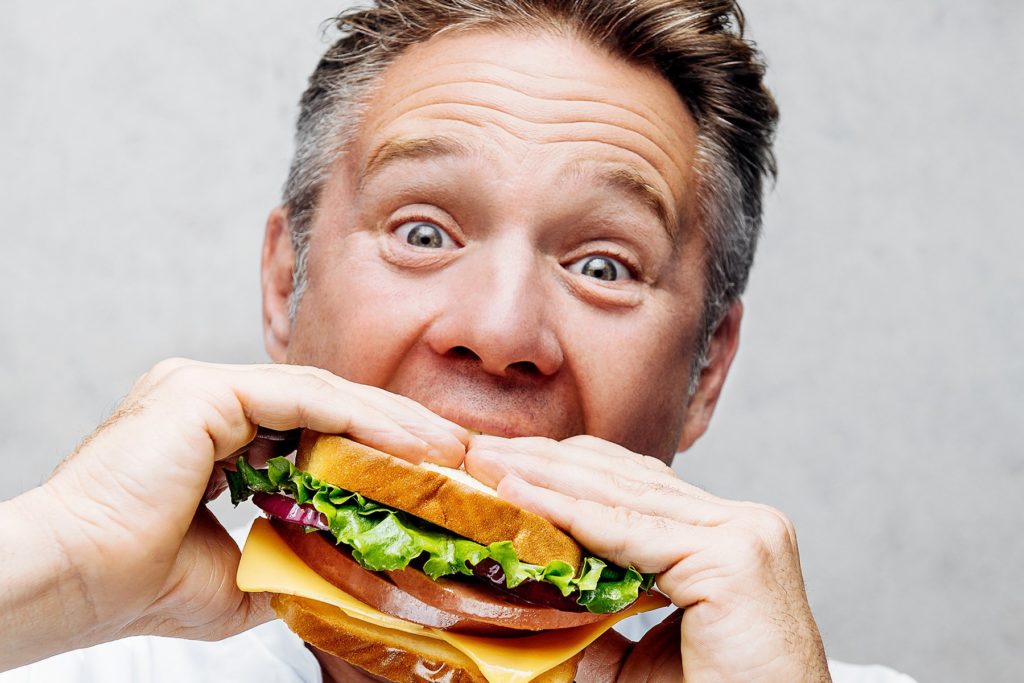Sure, eating fast can lead to gaining weight. But did you know that it may also add to your risk for diabetes, heart disease and stomach problems?
Look around any restaurant, and you’re likely to see at least some of the diners chowing down like it’s the last 30 seconds of a speed-eating contest. Eating is one of life’s great joys. So why are so many of us rushing to get through it? Sure, you can power through meals faster and save yourself a little time. But are you putting your health at risk by eating too fast?
Often, fast eating is just one part of an overall fast-paced lifestyle. If you’re always working, playing, walking, talking and driving in hurry-up mode, it’s easy to fall into the habit of eating that way, too. But this habit comes at a price: Wolfing down your food not only detracts from the pleasure of a good meal. It may also take a harsh toll on your health. Eating too fast comes with a whole host of health risks, and failing to take your time could put you in danger of developing serious health conditions.
It might sound dramatic, but your health is on the line when you’re scarfing down your meals too quickly. You could find yourself dealing with any of the following health risks of eating too fast.
1. Obesity
Fast eating is associated with an increased risk of being overweight or obese. So it’s no surprise that both chewing less and eating quickly have been linked to consuming more food and calories.
Even several minutes after a meal ends, fast eating may still be having an impact. In one study, participants who scarfed down lunch felt hungrier afterward, compared to those who ate at a more leisurely pace.
What’s the connection? Eating quickly may disrupt gut hormones that help regulate appetite and tell you when you’re full. In a small study from Japan, fast eating also reduced the thermic effect of food — the boost in metabolism that occurs after eating.
2. Diabetes
Fast eating in itself doesn’t cause type 2 diabetes. But it’s possible that habitually bolting down your food might give your body an extra nudge in that direction. In a large study, middle-aged men and women without diabetes who said they were fast eaters were at increased risk for insulin resistance. This condition, in which the body doesn’t use insulin effectively, may lead to diabetes over time.
Of course, eating fast is related to obesity — and obesity is a major cause of insulin resistance. But at least for the men in the study, fast eating added to their risk even when the researchers controlled for BMI levels.
3. Metabolic Syndrome
Insulin resistance is closely related to metabolic syndrome — a cluster of factors that increase the risk of developing not only diabetes, but also heart disease and stroke. One study included nearly 9,000 people, ages 40 and up, who didn’t have metabolic syndrome at the outset. Over the next three years, fast eaters were more likely to develop metabolic syndrome than those who ate more slowly.
In particular, fast eaters were prone to having large waistlines and low levels of HDL (“good”) cholesterol. These are two of the risk factors that make up metabolic syndrome, and they’re often harbingers of heart disease.
4. Gastritis
Fast eating has also been linked to erosive gastritis — inflammation that eats away at the lining of the stomach, causing shallow breaks or sometimes deep ulcers. In a study from Korea, more than 10,000 patients got checkups including an upper GI endoscopy — a procedure using a lighted tube with a tiny camera that’s run down the throat, through the esophagus and into the stomach. Doctors were more likely to find signs of erosive gastritis in patients who said they were fast eaters.
One possible reason: People who gulp down their food are more likely to overeat. And overeating, in turn, causes food to sit around in the stomach longer, so the stomach lining is exposed to more gastric acid.
5. Choking
You know how fast eaters say they “inhaled” their food? This could become a reality someday. We teach kids to eat slowly and chew their food carefully to prevent choking. Grown-ups would be wise to do the same. Don’t put yourself at risk for choking because you’re eating too fast; instead, take the extra seconds to fully chew and swallow appropriately.
Slow Down, You Chew Too Fast
For many of us, rushing through meals has become second nature. Breaking that habit takes some conscious effort. These strategies can help you develop a new habit of slowing down and savoring your food:
Allow enough time. Make meals a priority item on your schedule. Block off at least 20 minutes for each meal. It can take that long for your body to send signals about fullness to your brain.
Enlist all your senses. When you first start eating, take a few moments to really notice the aroma, flavor, crunchiness, texture and other sensory properties of the food. Then keep noticing these things as the meal goes on.
Choose more chews. Take small bites, and chew them thoroughly. In addition to slowing you down, chewing well makes food easier to digest, which increases the absorption of nutrients.
Put down that fork! It’s easy to slip into a robotic eating rhythm. Before you know it, you’re shoveling food into your mouth with the efficiency of an eating machine. Setting down your utensils between bites helps prevent that.
Revive the art of table talk (even if you’re not sitting at a table). Chatting between bites is one of the most pleasant ways to stretch out a meal.
Instead of hurrying to finish your meals, try practicing intuitive eating. Taking your time with every bite can help you get in tune with your body and lower your odds for all of the risks of eating too fast. Plus, you’ll actually enjoy what you’re eating!




















